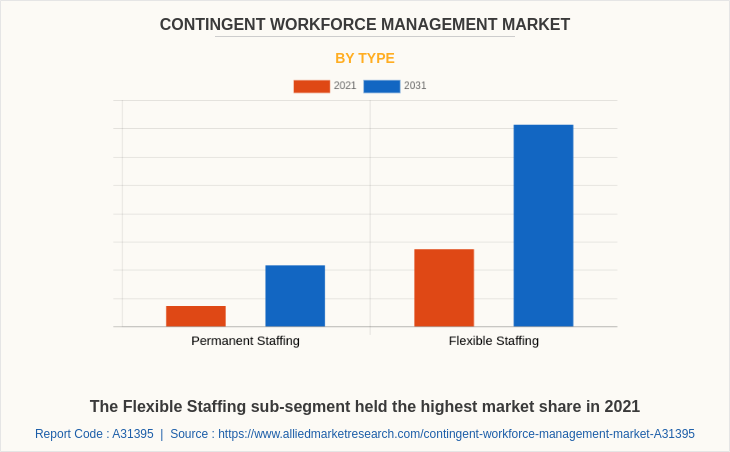Contingent Workforce Management Market Insights, 2031
The global contingent workforce management market was valued at $171.5 billion in 2021, and is projected to reach $465.2 billion by 2031, growing at a CAGR of 10.5% from 2022 to 2031.
Contingent workforce management is the process of efficiently identifying and engaging non-permanent workers in a company. It includes hiring and assigning tasks. Additionally, while contingent workforce management has numerous advantages, it also has many challenges. The flexibility of this workforce allows a corporation to grow, but it is also unstable and less reliable. While consumers may have to provide contingent employees fair control of the task, it is critical to manage the quality of the work they create because the final responsibility rests on the corporation.
The increasing demand for flexible workforces is one of the most important growth factors for the market. The primary factors boosting the growth of the worldwide contingent workforce management market are rising population, shifting demographics, and labor force participation rates, and they are anticipated to do so for the foreseeable future. These aspects all contribute to the market expansion since employers frequently utilize contingent workforce management to control the availability and skill set of their employees while also helping them to maintain a high level of productivity.
The contingent workforce management lack commitment to the organization when compared to core workers. Contingent workforce management has a greater turnover rate and may provide a security concern. Additionally, the main issue with contingent workforce management is that the workers are likely to be difficult to incorporate into the organization and may suffer from low morale. All of these reasons limit contingent workforce management market growth.
The main advantage of the market is that a company's usage of contingent workforce management services helps to minimize expenses. In terms of wage and benefits, contingent employees are frequently less expensive. Furthermore, many contingent workforce management services are rapidly expanding, so the organization does not need to spend more money on new employee training. Furthermore, contingent workforce management improves the potential to develop consumer businesses and fill open positions faster than any other approach.
The key players profiled in this report include Avature, Beeline, BOWEN Group, Impartx, Coupa Software Inc, SAP SE, CXC Global, Magnit, Ramco Systems, and Zeel Solutions Ltd.
The global contingent workforce management market is segmented on the basis of type, end user, and region. By type, the market is divided into permanent staffing and flexible staffing. By end user, the market is classified into IT and telecom, BFSI, healthcare, manufacturing-automotive, business/professional service, retail trade, pharma/biotech/medical equip, manufacturing-consumer products, government (excluding education), transportation/warehousing/packaging, real estate and rental leasing, and others. By region, the market is analyzed across North America, Europe, Asia-Pacific, and LAMEA. The contingent workforce management market is segmented into Type and End-suer Industry.

By type, the flexible staffing sub-segment dominated the market in 2021. Companies use flexible staffing as a technique to manage their contingent workforce management. A contingent workforce management is used by HR departments and other departments to solve changing business and operational issues and as an alternative to employing permanent staff. Furthermore, when companies adapt to changing business requirements and crises, flexible staffing promotes flexibility, optimizes costs, and accelerates the acquisition of much-needed talent. Companies may efficiently future-proof their business by recalibrating their personnel through flexible staffing. The advantages of a flexible employment approach include quick and economical access to specialized expertise. These are predicted to be the major factors affecting the contingent workforce management market size during the forecast period.
The business/professional service sub-segment is projected to grow with the highest CAGR from 2022-2031
By End-suer Industry
By end user, the healthcare sub-segment dominated the global contingent workforce management market share in 2021. A healthcare organization hires contingent workforce management on a short-term, per diem, or consultancy basis. Contingent employees cover staffing shortfalls without being required to offer benefits or pay employment taxes. Furthermore, healthcare organizations that use contingent workforce management may benefit from cost reductions. Employers save money on hourly salaries, payroll taxes, and benefits since contingent workers are not paid as employees. These factors are driving the contingent workforce management industry in healthcare segment.

By region, Asia-Pacific dominated the global market in 2021 and is projected to have the fastest-growing market during the forecast period. The contingent workforce management demand in countries, namely China and India, is growing rapidly as China's industry for contingent workers has enormous growth potential because of the country's rising labor force participation rate and rapid industrialization, which have increased the demand for flexible workers from businesses in a variety of sectors, including the manufacturing, ITES/BPO, and retail sectors.
Impact of COVID-19
- The COVID-19 pandemic has brought several uncertainties leading to severe economic losses as various businesses across the world came to a standstill. This has ultimately lowered the demand for contingent workforce management due to health issues of employees and decrease in demand of IT sector; this factor affected almost every industry’s growth and resulted in an economic slowdown across several countries.
- COVID-19 has been a catalyst for new and better contingent workforce solutions. As flexibility becomes the norm for businesses in light of the pandemic and global lockdowns, firms have begun to recognise just how valuable external workforces can be. And with a growing need to streamline costs, transparency of contingent spend has understandably been a focus for both HR and Procurement teams.
- Economic slowdown has affected the setup of new contingent workforce management projects across the world as majority of government fundings were diverted towards healthcare sector owing to rapid spread of the COVID-19 virus, impacting the market to the great extent.
Key Benefits for Stakeholders
- This contingent workforce management market forecast report provides a quantitative analysis of the market segments, current trends, estimations, and dynamics of the contingent workforce management market analysis from 2021 to 2031 to identify the prevailing contingent workforce management market opportunities.
- The market research is offered along with information related to key drivers, restraints, and opportunities.
- Porter's five forces analysis highlights the potency of buyers and suppliers to enable stakeholders make profit-oriented business decisions and strengthen their supplier-buyer network.
- In-depth analysis of the contingent workforce management market segmentation assists to determine the prevailing market opportunities.
- Major countries in each region are mapped according to their revenue contribution to the global market.
- Market player positioning facilitates benchmarking and provides a clear understanding of the present position of the market players.
- The report includes the analysis of the regional as well as global contingent workforce management market trends, key players, market segments, application areas, and market growth strategies.
Contingent Workforce Management Market Report Highlights
| Aspects | Details |
| Market Size By 2031 | USD 465.2 trillion |
| Growth Rate | CAGR of 10.5% |
| Forecast period | 2021 - 2031 |
| Report Pages | 280 |
| By Type |
|
| By End-user Industry |
|
| By Region |
|
| Key Market Players | Zeel Solutions Ltd., IMPARTX, SAP SE, PRO Unlimited Inc., Coupa Software Inc., Beeline, the bowen group, cxc global, Ramco Systems Ltd, avature |
Analyst Review
The contingent workforce for short-term jobs helps consumers save money. Consumers, unlike actual workers, do not have to manage or incur their own overhead expenditures. Furthermore, companies are not required to give workers with additional employment advantages like as health insurance, bonuses, paid time off, and so on. As a result, a contingent workforce management assists consumers in completing short-term tasks or projects more quickly and cost-effectively; these aspects are driving market expansion. The contingent workforce management market has been affected. Because of the industry's small number of significant companies, the contingent workforce management field is extensively targeted; these characteristics limit market development. Customers would benefit from contingent workforce management research because they would be informed about the present condition of contingent workforce management. Many companies might benefit from a company study on contingent workforce management in discovering and developing worldwide demand. The contingent workforce management market growth includes micro and macro trends, significant innovations, and utilization and penetration across a wide range of end-users.
Among the analyzed regions, North America is expected to account for the highest revenue in the market by the end of 2031, followed by Asia-Pacific, Europe, and LAMEA. Rapid industrialization and urbanization are the key factors responsible for leading position of North America and Asia-Pacific in the global contingent workforce management market.
The increasing demand for flexible workforce in one of the major market drivers. In addition, changes in demographics, increasing population, and labor force participation rates are key drivers fueling the global workforce management market growth and are expected to continue doing so in the foreseeable future is estimated to generate excellent opportunities in the contingent workforce market.
The major growth strategies adopted by contingent workforce management market players are investment and agreement.
Asia-Pacific will provide more business opportunities for the global contingent workforce management market in the future.
Avature, Beeline, BOWEN Group, Impartx, Coupa Software Inc, SAP SE, CXC Global, Magnit, Ramco Systems, and Zeel Solutions Ltd. are the major players in the contingent workforce management market.
Healthcare sub-segment of the end user acquired the maximum share of the global contingent workforce management market in 2021.
IT industry leaders and manufactures are the major customers in the global contingent workforce management market.
The report provides an extensive qualitative and quantitative analysis of the current trends and future estimations of the global contingent workforce management market from 2022 to 2031 to determine the prevailing opportunities.
Loading Table Of Content...




